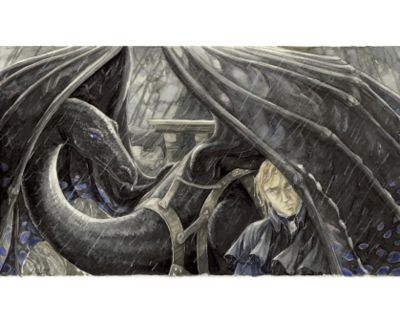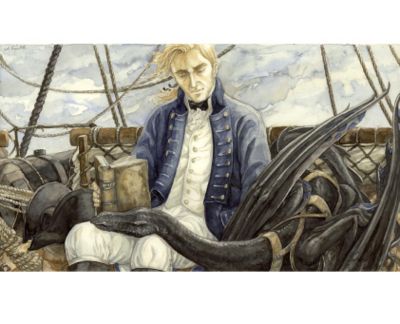Dragon Relationships with Captains
In most circumstances, a dragon's captain was the human who harnessed the dragonet at birth. The dragonet permitted the human to do so, and to give the dragonet a name.
In the Aerial Corps, dragons had enormously close relationships with their captains, generally ones of mutual affection and respect. However, this was not always the case. Capt. Jeremy Rankin was neglectful of Levitas to the point of abuse, but could not be removed from his post because Levitas continued to obey his orders and to crave Rankin's love and approval. Other dragons were less tolerant. Majestatis purposefully "mislaid" his captain and chose to live in the breeding grounds instead.
The partnership between dragon and captain could also be ended by the captain. Perscitia's captain gave her up after she made it clear she would not fight.
In most cases, however, the relationship with the dragon generally became the most important one in the captain's life, making it very difficult to live a "normal life" during the captain's off-duty time. This led to aviators' development of a culture largely apart from society, and not well-respected by it, despite the extraordinary sacrifices they made for their service.
Many larger dragon breeds had long lifespans, and the dangers of battle aside, they were likely to outlive their captain. Dragons found this fact painful and difficult to accept. Anytime a dragon lost his or her captain, all the dragons present, especially younger ones, were likely to become depressed and upset.
Despite the difficulty of maintaining familial relationships, aviators often had children with the intent the child would enter the Corps and provide a new captain for their dragon upon their own death. Emily Roland, for example, was intended to become Excidium's captain upon Jane Roland's death. This did not always work out, however; Rankin was an example of the downside of the familial tradition of service. Rankin's family had been captains to Celeritas, but he refused to accept Rankin, who was clearly ill-suited for the Corps, and Rankin harnessed the unfortunate Levitas instead.
Also, the way dragons were treated varied between different nations. In China, it was the dragon that chooses the captain, which did not happen at hatching. All potenial captains went to school first. These classrooms also had dragon students. The Chinese believed it was good luck simply to see a dragon. While the Chinese did have their own Aerial Corps, warfare was considered a low occupation for a dragon and the Captains were exclusively women. Unlike the British or French, the Chinese did not use dragons exclusively for wars. (The Celestials live in a palace where they stayed away from violence despite their "divine wind" ability.)

